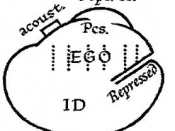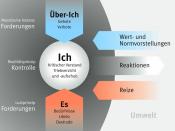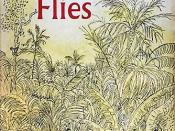Lord of the Flies
Sigmund Freud came up with the idea that human conscience can be broken down into three parts: the id, the ego, and the superego. Everybody has all three parts, if some are more prominent than others. The id is the part of the psyche that is unconscious and the source of primitive instinctive impulses and drives. The ego contains consciousness and memory and is involved with control, planning, and conforming to reality. The superego is the part of the mind that acts as a conscience to the ego, developing moral standards and rules through contact with parents and society. The superego and the id often conflict with one another and only the person himself can force either one to prevail. Situations, such as being stranded on a deserted island with a group of boys as in Lord of the Flies, can also force one's psyche to combat with itself, either moving towards the id, or the superego.
In the novel Lord of the Flies, William Golding uses various characters to show that this dynamic can change a person so severely, that they will either become savage, or their superego will be strong enough to predominantly override the push towards the id.
The antagonist of the story, Jack, showed the id conquering the superego through most of the story, save the beginning before he had killed a pig. When he first was confronted with an opportunity to slay a pig, he did not take it because the idea of taking life was too much for him. "They knew very well why he hadn't [killed the pig]: because of the enormity of the knife descending and cutting into living flesh; because of the unbearable blood. (31)" When the other boys ask Jack why he didn't kill...


